22 Event Marketing Strategies In 2022.
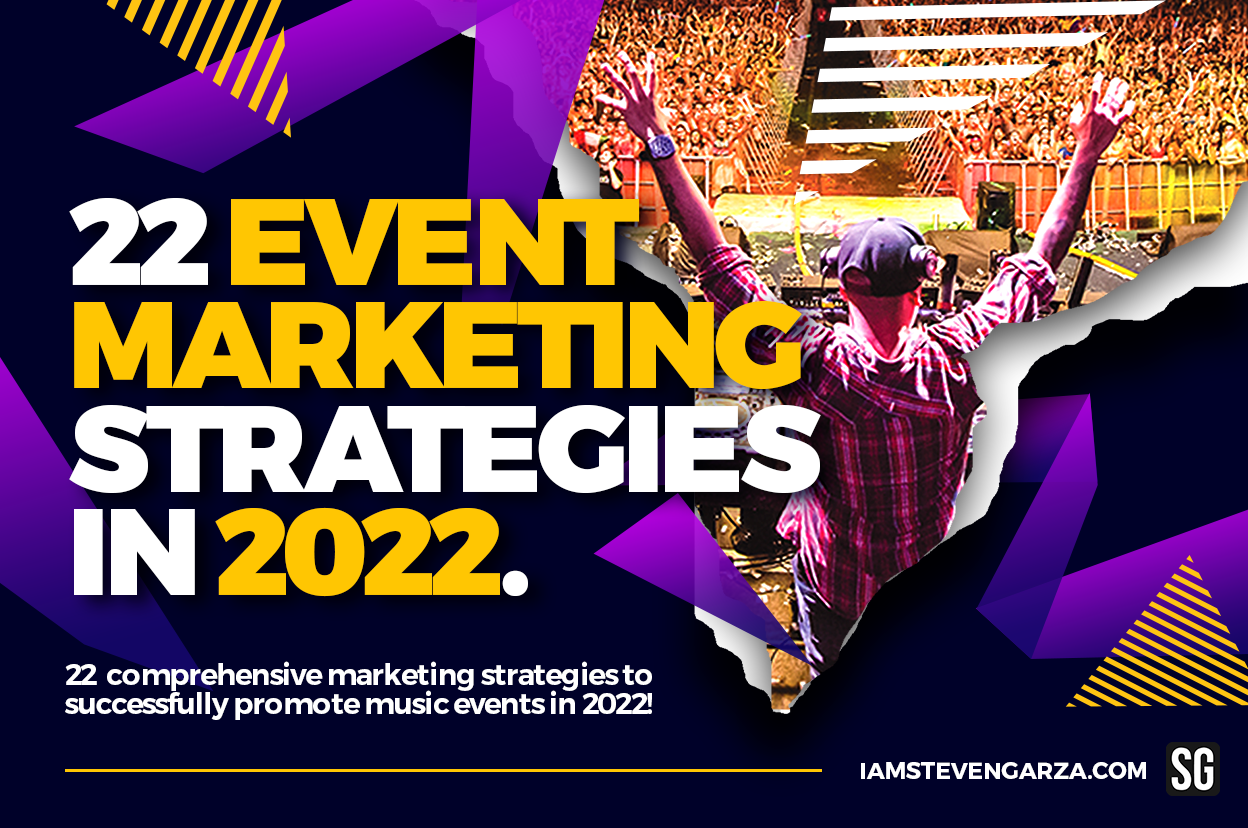
The number 1 goal that all event and concert promoters strive for, is to sell out their events.
Whether you are hosting a large-scale festival, a recurring branded nightclub event, or a virtual event, an effective event marketing strategy is essential to the success of the event and any company’s bottom line.
If you know your organization’s goals before planning, you can ensure that every phase of your event is optimized for success.
However, with unfaltering changes in digital media and its influence on consumers, event marketing strategies have to continue to evolve to meet the changing demands and behaviors of consumers in an evolving market.
Event promoters need to continue to push the boundaries of creativity to capture attention, analyze consumer behaviors to engage, and stay on top of technological trends to be present in the technologies these audiences choose to interact with.
Web3.0 will do today for marketers what social media did for them in the early 2010s. This shift will be ushered in through immersive, branded, experiential, and VR-enabled realities. Just like brick-and-mortar audiences went to social media back then, these audiences will follow the same brands into metaverse communities.
Forward-thinking marketers are already experimenting with NFTs to accomplish a wide array of goals — from driving brand awareness to increasing customer loyalty and creating additional streams of revenue by monetizing their user bases.
In 2022 there is an immense amount of digital platforms, marketing tools, and strategies that are available to help facilitate that goal, but where do you start?
In this article, I am going to narrow it down to 22 event marketing strategies to consider to expand or update a promotional playbook in 2022.
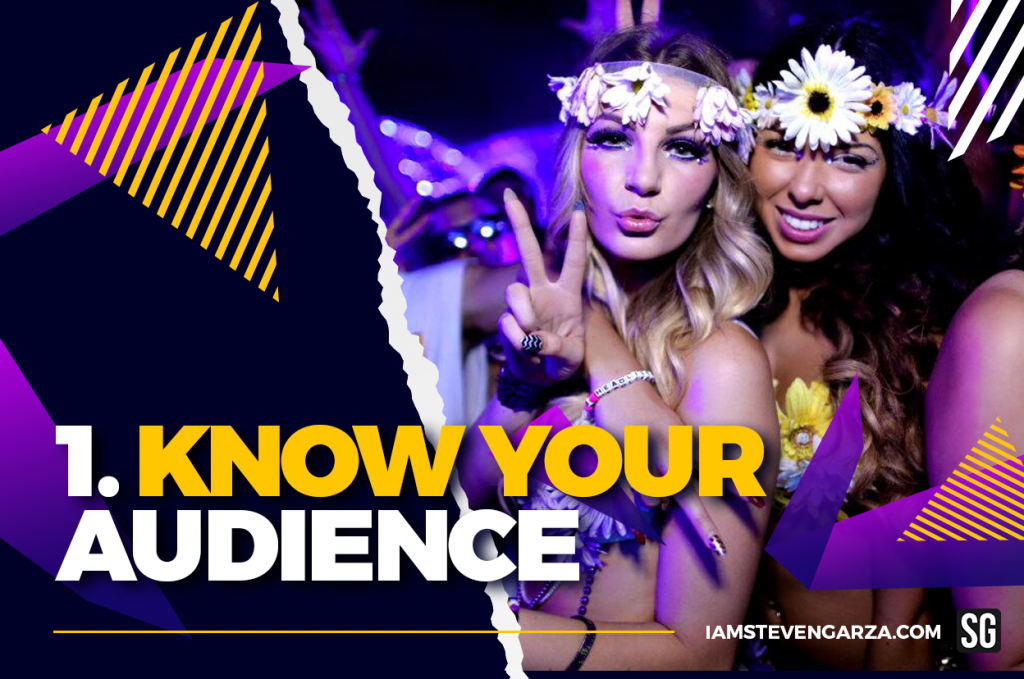
I know what you are thinking, this is common sense, right? However, you would be surprised at how many working professionals assume that they know an audience simply because they have worked in the space for years but never spent any time researching changes in their demographics.
Audience profile behaviors and interests are constantly evolving as technology and information become more available, and also as new generations enter as potential customers.
As event promoters, we can influence the industry by promoting events, but consumers are the ones who will determine how successful we will continue to be if we effectively adapt and evolve with market changes and our audience’s behaviors.
The way we market events in electronic music today is not the same way we did several years ago. I recently posted an EDM Audience Analysis in 2022 on my blog that highlights some of these changes.
It’s crucial to understand your audience and know how to engage them before you begin to develop a complex or even practical event marketing strategy.
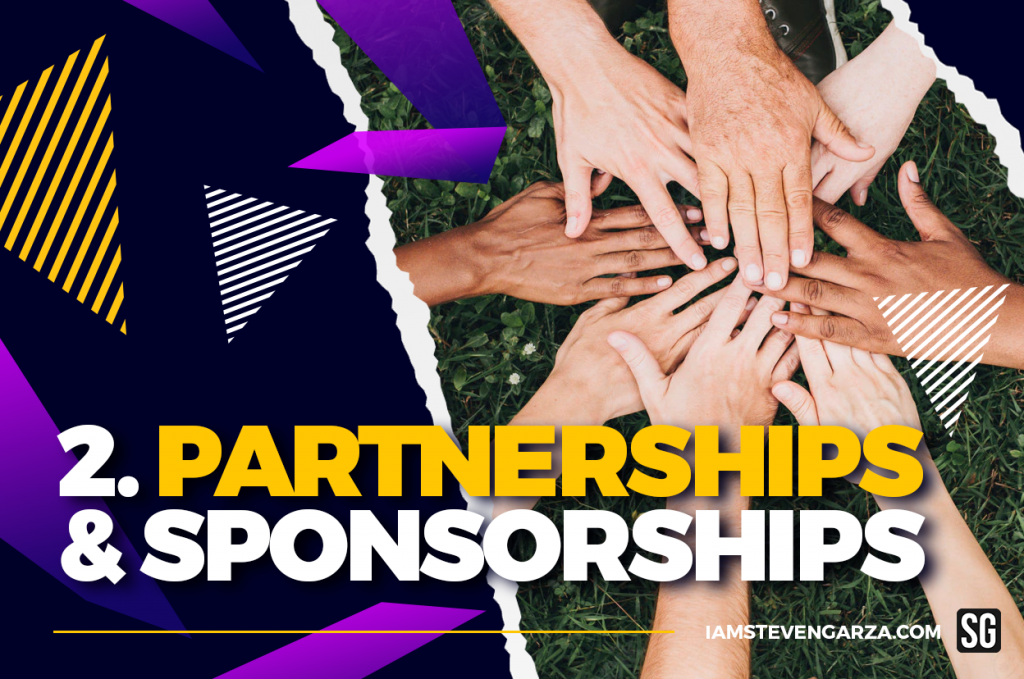
A good way to introduce a new event is to explore forming a partnership with established promoters or sponsors who may be influential to your audience. Initiate a conversation and offer ways your event can open promotional opportunities for all parties.
If you bring your sponsors in during the planning stage of an event, they may also be able to also assist in cross-marketing strategies to contribute to the success.
When you partner with another event promoter or sponsor, you extend your platform, visibility, and in some cases credibility. By combining forces with another event brand that understands how to maneuver the landscape and possesses an established network, you can set yourself up to increase ticket sales just by association.
The event partnership should be mutually beneficial to ensure a strong partnership and positive outcomes for all who are involved.

Create Thought-Provoking Marketing Collateral.
Have you ever seen a flyer, video, or a post on social media of an event and thought to yourself… I can’t wait… I wish I was already there!?
Panic Room Coming Soon Teaser Video
A proven method to get an audience’s attention and talking since the beginning of event marketing, especially in electronic music, is to create visually stunning flyers, graphics, videos, and now Augmented Reality, to bring your presentations to life and help sell the experience of attending the event.
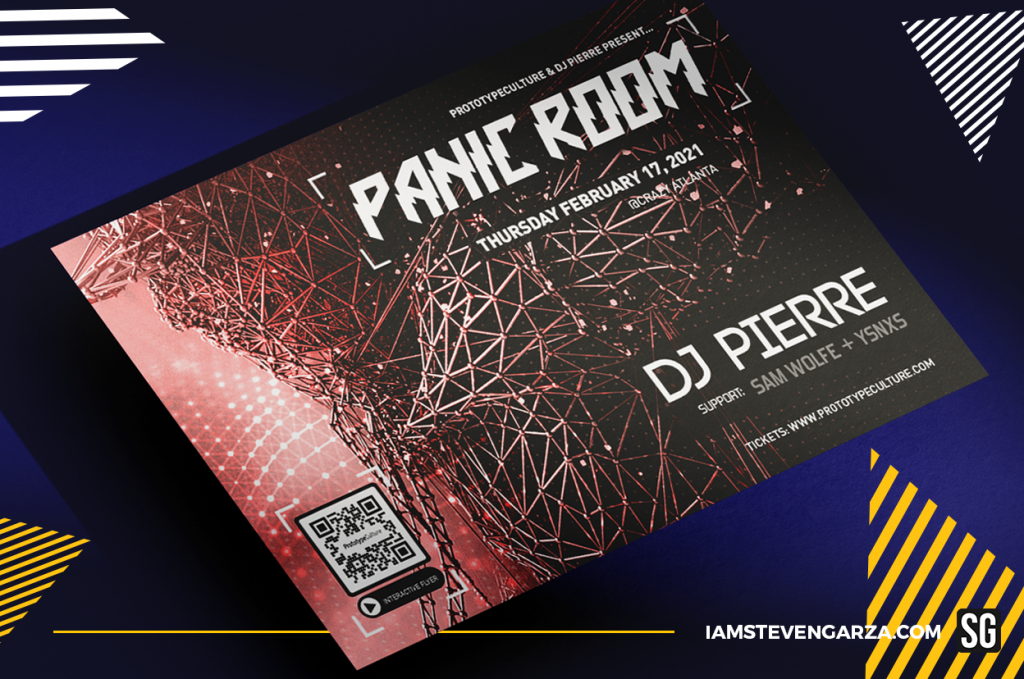
Web3.0 also presents many experiential opportunities to bring your marketing materials to life with Augmented Reality, Mixed Reality, and Virtual Reality.
High-quality visual content that mirrors the quality of the event is important. It paints a picture of what to expect at the event. In addition, social media advertising research consistently shows that organic and paid video content performs up to 10x times better than static content, so creating videos to promote the event is important.
Panic Room Electronic Flyer
The more people share your content, the more event-goers will discover your event, and the more excitement is generated around the event.
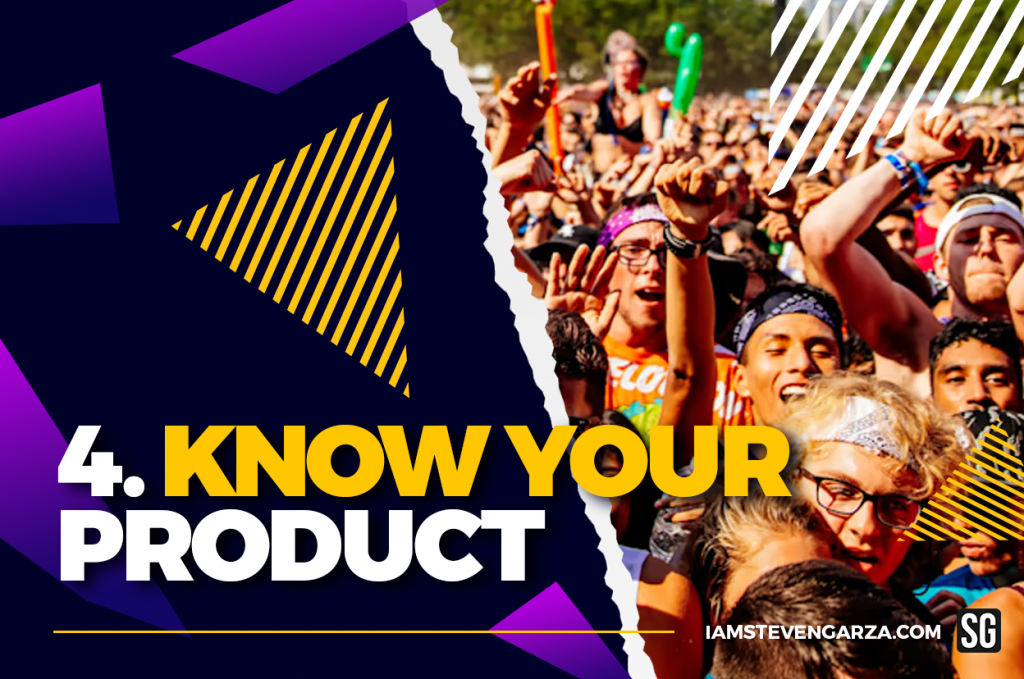
Develop a Content Marketing Strategy before you advertise.
Ever heard content is king? Content marketing is one of the most effective ways one can reach audiences in event marketing. It expands the opportunity to inform audiences about ALL of the value an event has to offer outside of the main selling point which is usually the act(s) performing at the event.
Advertising provides very specific calls to action and a very limited time to capture an audience’s attention. Identify everything your event has to offer that provides value and tell the story.
With a content marketing strategy, event promoters can build an event roadmap with entertaining content leading up to the event to emphasize all of the value the event has to offer and why its audience can’t afford to miss the event.
Prepare the story of your event and deliver it utilizing all stages of your audience’s buyers’ journey to mirror and synchronize with your advertising strategy.
Then, create a content calendar to provide scalable publishing solutions to distribute on websites, blogs, social media, ticket vendors, emails, and SMS to deliver a cohesive messaging strategy at every stage of the marketing funnel.
The more people trust your event’s brand, the more likely they are to share the event and buy tickets to attend.
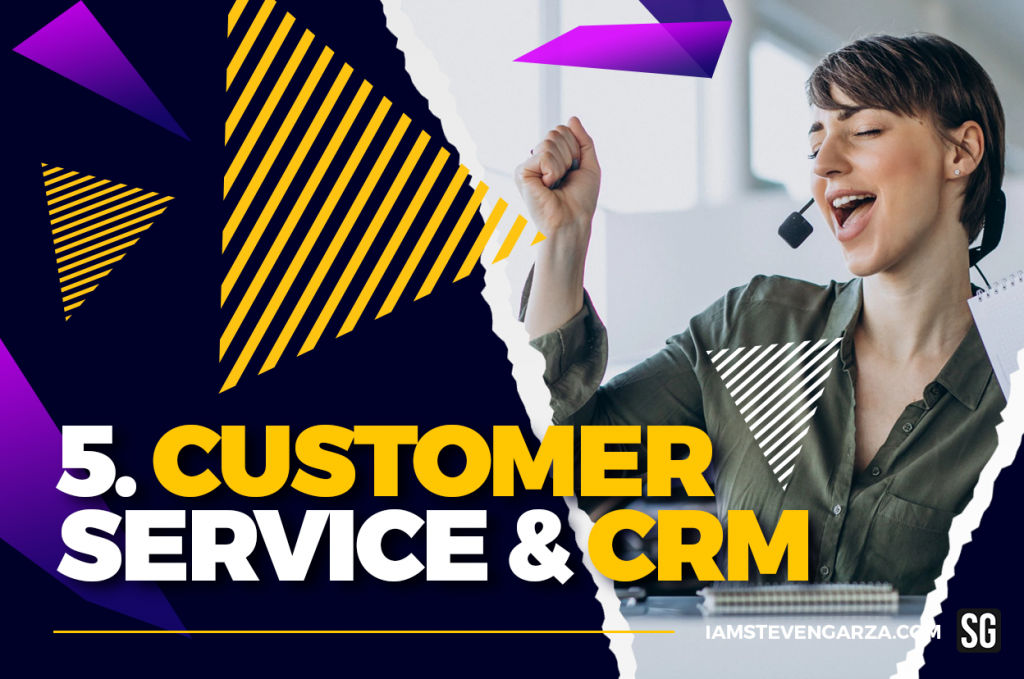
Customer Service
As marketers, we place a lot of attention and money into reaching potential customers, but often not enough on providing good customer service during and after a buyer’s journey.
Having good customer service via a website, email, social media, and in-person will ensure that potential and current customers develop positive feelings towards the brand and have positive things to say when the brand is brought up.
A good example of this is Chic-fil-A. You know you are going to be greeted well, treated well, and have an overall positive experience when you visit one of their locations even though it’s fast food.
Your audience is the real headliners.
It’s very important to give your audience the Chic-fil-A treatment before the event, at the event, and after the event to ensure that they feel appreciated and know that you do care, and doing so will also create a lifelong customer that will be an advocate of your brand for life.
In addition, if you don’t provide good customer service you can potentially lose your audience after spending a lot of money on advertising to gain them.
Customer Relationship Management
Integrating CRM makes it a lot easier to manage an events community as a whole when the data from your event registrants go directly to your CRM. This will make it easy to segment and market to your attendees and have an organized list of people you can promote to during the event and after.
If your event lead generation strategy doesn’t have an integration for CRM, it’s time to start thinking about the value of doing so.
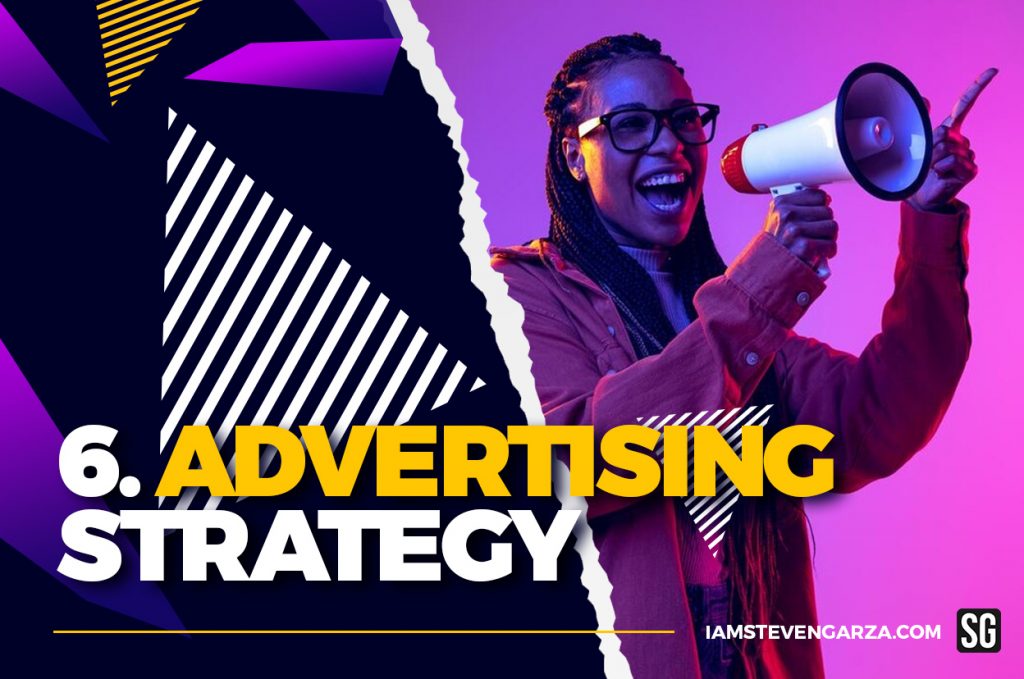
So you have identified your audience, secured sponsorships, created your marketing collateral, and integrated a content marketing strategy and customer service. Are you ready to develop an event advertising strategy?
A digital marketing strategy’s success lies in your ability to set specific goals that are measurable, achievable, relevant to your audience, and time-bound. These are the principles that need to be observed before you begin to develop an advertisement strategy.
There are many digital advertising solutions available but to clear through the clutter, we are going to focus on one of the most important options available in event marketing which is pixel tracking.
What are pixels?
A tracking pixel is a 1×1 (pixel dimensions) image that’s placed inside a website’s source code, using a landing page, email, or banner ad. The pixel is the size of a pixel so users can’t see it, but this technology does a lot for its size!
Tracking pixels record events, such as ticket purchases, and collect user profiles with the code on any website. By integrating this code with your event ticketing partner’s system, you can also place pixels on your event listings and final receipt pages to measure the health of all of your online advertising campaigns.
What are the most common types of pixels?
Retargeting Pixels
Retargeting pixels track visitors’ activity on your website and allow you to send ad campaigns to them directly if they leave without taking the action you wanted them to take, like making a purchase.
Ever seen products that you were looking at all of a sudden appear on a lot of websites and social platforms you’re browsing? That’s ad retargeting.
Conversion Pixels
Conversion pixels track the actual sales or any other defined conversion metric from your ad campaign, which assists in evaluating your campaign’s success.
Why are marketing pixels important in event marketing?
Conversion and Remarketing pixels are important because the information gathered allows you to understand your buyer’s journey, learn more about your visitors, and use that information to iterate and improve marketing efforts.
Pixels are also used to continue the conversation through paid ads after they’ve left your site especially if they didn’t complete a desired or expected action, like making a purchase.
What are the most common ad platforms using pixels?
There are many platforms out there that provide pixel advertising technology, but the most popular ones are Google AdWords, Bing, Facebook, AdRoll, and Twitter.
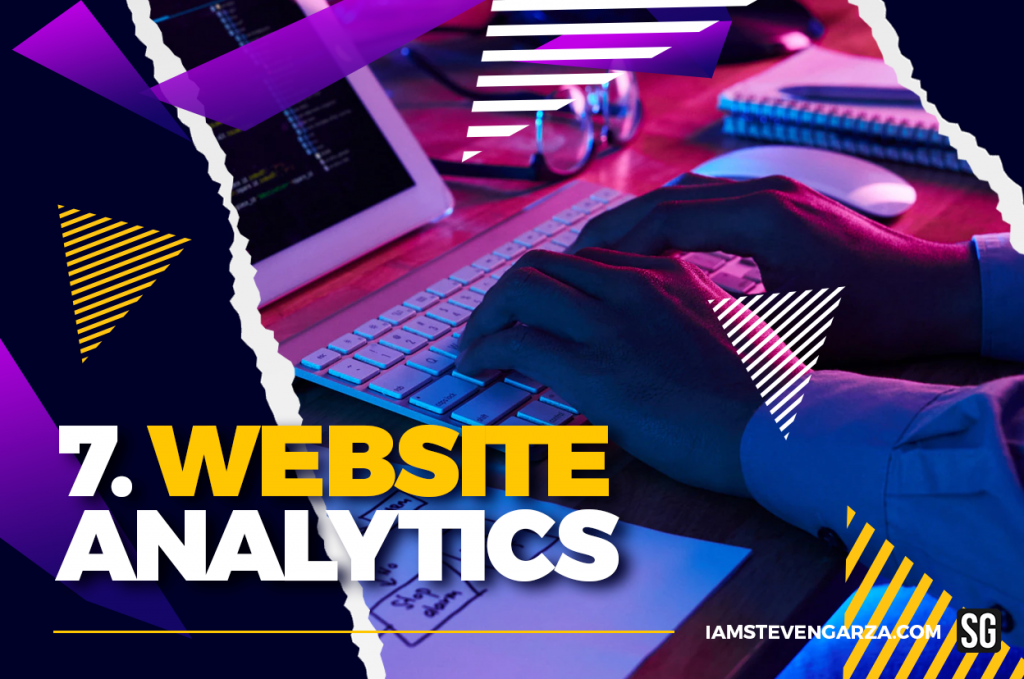
The more you know about how your guests found you, the more informed you are in making decisions to promote events in the right channels. Web metrics and analytics are vital tools to measure the success of your marketing efforts.
You’re doing yourself a great disservice if your website, and ticketing service, do not offer analytics tools to understand how people are getting to your site and what motivates them to stay and purchase tickets.
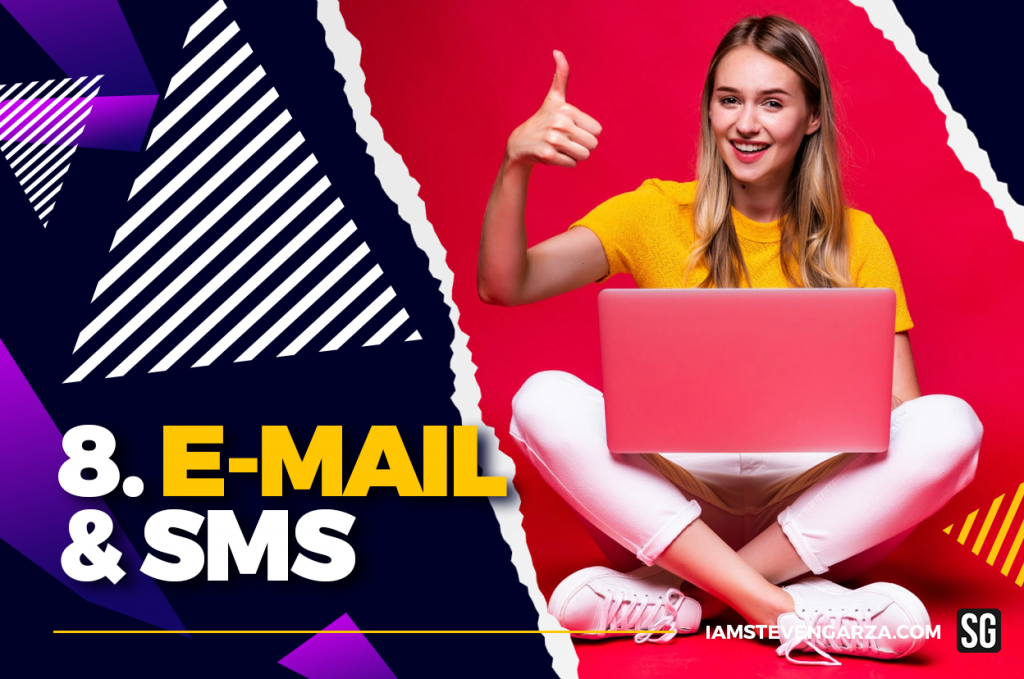
E-mail and SMS marketing remains one of the most effective methods to market events directly to your audience. However, if you’re simply just blasting your entire database every time you make an announcement or book an artist, you might need to reevaluate your strategy.
To begin with, it’s important to have a lead generation strategy in place to ensure that you can continue to engage customers directly and segment your lists into categories with people who have bought tickets in the past versus those who haven’t, or different demographics within your target audience.
Then create campaigns that speak to those groups with specific messages that aren’t spammy to ensure that they don’t opt for future communication.
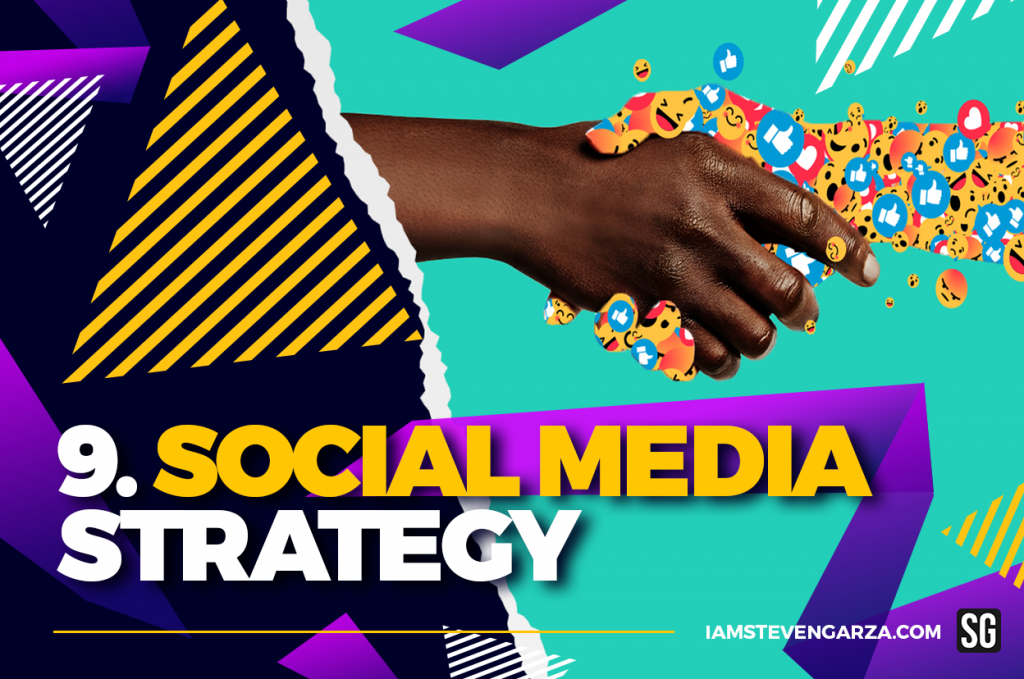
Using social channels to showcase your past events as well as promote upcoming ones will get people talking. Take advantage of the chatter by monitoring social and engaging with those discussing it and using your hashtag to encourage a larger event community. Create a space where people can gather, network, and develop relationships that can extend past the individual events you organize.
Create a Facebook Event & Group
There is a lot of debate regarding organic and paid marketing effectiveness on Facebook due to its very well-documented algorithm challenges and also the fact that younger demographics don’t engage with the platform as well as they do on others. But Facebook remains one of the most visited social media networks and provides free event marketing tools that other platforms don’t Facebook’s Audience Network also allows to advertise on games and mobile apps outside of Facebook in a way other social media networks can’t. Because of that, Facebook should still be observed as a way for event discovery.
Creating an event branded Facebook event and group is a great way to organically build a community around an event generate interest and encourage potential attendees to interact and stay engaged. Promoters can utilize their network of friends and their network of friends, to grow the event and group. Integrate the content marketing strategy and deliver pictures, videos, content, and promotions leading up to the event.
Continue Your Events Story On Social Media
The Stories features on Snapchat, Instagram, and Facebook, along with the live video features available on TikTok, Facebook Live, and YouTube, offer potential event marketing strategies.
Audiences love to be engaged by stories. As you prep for your event, and throughout the event itself, engage your social audiences with in-the-moment insider stories. This is an intimate way to make people feel connected to your event and more inspired to attend.
Turn Attendees into Event Ambassadors
You can hire a brand ambassador, or you can leverage your event guests to be ambassadors. Show your audience a good time and you can bet they’ll be sharing their experiences with their friends and colleagues.
Step it up a notch and provide them with some event swag, or plenty of Instagram-able and TikTok-able moments that will become conversation starters and promotional pieces that will get them singing your praises long after the party has ended.
If they have a significantly large network, provide them with an incentive by offering a personal link to share where they earn a percentage of each ticket sold.
Hire a Social Media Brand Ambassador
The highest echelon of “influencer marketing” is the paid brand ambassador. Seek out people with vast online influence such as local celebrities, subject-matter experts, popular bloggers, and YouTubers. Enlist them typically with financial compensation to create strategic and timely posts about your event.
Make your audience the real headliners
Your attendees are your biggest fans. With good customer service and a positive event experience, you can reach out to your audience and reap the rewards of all of your hard work. Find those people, and motivate them to help you spread the word online. You can use technology tools like SocialLadder to find, manage, and capitalize on social influencers in your sphere.
Empower your grassroots marketers with badges
When someone buys a ticket or registers for your event, send them a badge or icon they can display on their website, and post on social media on their timeline and profile picture. Build HTML into these graphics, and viewers can link right back to your event page.
Develop a social media ticket giveaway
This might be as simple as your basic enter-to-win sweepstakes, or something more unique and playful: a judged Snapchat drawing contest or a tag-a-friend contest (“Who would you bring?”). People love to share chances to win with their friends. Just make sure you study up on the rules and regulations each social media platform upholds around contests.
Encourage Widespread Sharing At Your Event
Make it easy and enticing for attendees to share photos and videos from your event with their friends at home who could become attendees at your next event.
Snapchat geo-filters are a playful way to layer a branded illustration over photos. Instagram photo booths can automatically post pics to Instagram for your attendees.
A Twitter wall displayed on a mega-screen encourages participants to tweet using your custom event hashtag.
Set up a ministudio to inspire some TikTok videos.
The possibilities are endless when it comes to creativity and social media interaction.
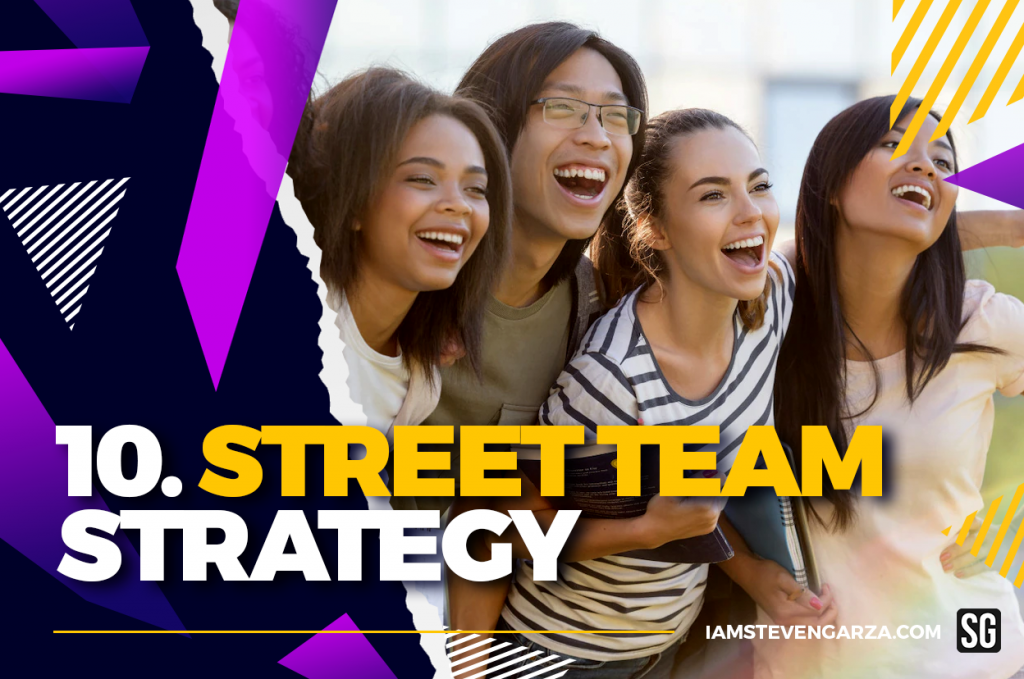
Street marketing is the oldest form of event marketing that remains an important way to engage audiences with human contact and personal interactions.
A street team is a highly effective guerrilla marketing tactic that targets consumers where they work and seek similar entertainment.
The strategy involves canvassing high-foot-traffic areas to get marketing collateral directly in front of consumers, make real-life connections, create brand awareness, and generate interest. It’s cost-efficient, easy to plan, and highly impactful.
When planning a street team marketing event, you’ll need to think about branding, staffing, messaging, locations, and permits. While it is relatively simple to plan a street team activation, there are several factors to take into consideration.
Make a strong effort in the initial planning stages. Research your target audience to find out their likes, dislikes, and interests, as well as where you may find them.
You’ll also need to research what permits you may need, how many samples your campaign will require, the types of branding materials, basic logistics, how many street team brand ambassadors you’ll need, and so on.
Think outside the box. Be innovative and creative. You don’t need to reinvent the wheel, but you can get ideas from past street team activations and then work to create something new and unique.
Take your time when making decisions such as finding the right brand ambassadors for your street team, where and when to best reach your audience, and the logistics of your activation. Allowing yourself to think through decisions will help to set your activation up for success.
Set goals and communicate them. Street team marketing is measurable, and you should set goals for your event. These goals should be based on what you want to get out of the activation – is the number of impressions made or the number of samples your brand ambassadors distributed? By setting KPIs, you can evaluate your program to see what worked and what didn’t and how you can improve in the future. Communicate your goals to your brand ambassadors so they understand exactly what is expected of them.
Don’t underestimate Mother Nature or local authorities. You should always have at least one backup plan in the event of inclement weather, being asked to leave a location, or other things that pop up that are beyond your control.
Brand ambassadors are the face of your company or brand. They can make your event successful, or they can cause it to fail. You’ll want to have a team of passionate, charismatic, and well-spoken brand ambassadors to represent your brand in the best light.
Don’t ship all of your event promotion materials to one event promotion manager. What if they have car trouble and can’t make it? A better solution is to send materials to a storage facility so that if there is a last-minute change, someone else can easily step in and pick up the materials.
Experiment with Experiential Marketing, Web3.0 & Metaverse technology.
Connect with your audience in more meaningful and fun ways with experiential marketing, which brings your brand to life with unique, and immersive experiences.
Much attention in the experiential marketing world is (rightly) being given to AR, VR, XR, and other hyper-reality tools in the metaverse. But equal weight should be given to web3 communities centered on DAOs (decentralized autonomous organizations), NFTs, digital currencies, index funds, and tokenized communities.
Experiential Marketing
Also called engagement marketing, experiential marketing is a marketing strategy that is quickly rising in event marketing. It immerses customers within a product or deeply engages them. In short, experiential marketing enables consumers to not just buy products or services from a brand but to experience the brand.
With NFTs and NFT-based tickets, new revenue opportunities are opening with endless ways to connect with your audience. For example, one could sell NFT tickets as collectibles, offer VIP experiences, and reward fans who collect many tickets. NFTs hold smart contracts which also enable marketers to automate experiential opportunities for their customers.
According to Forbes, experiential marketing can bolster a lasting connection between customers and a brand. It can also allow you to collect vital data about participating consumers which can then help you improve your strategy.
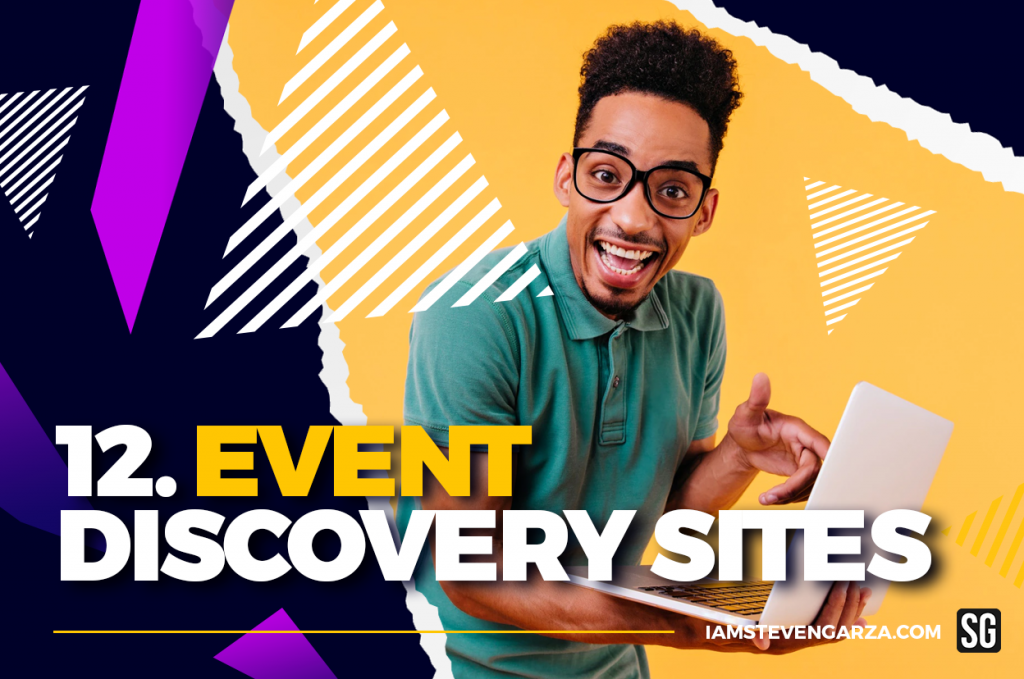
Before digital marketing was a thing, event listing directories or websites were some of the most common places for promoters to promote events on the internet, and it’s still today. This included bulletin boards, forums, e-zines, blogs, and lifestyle websites focused on music.
Today, some of those options are still available however there are event listing websites whose sole purpose is to provide event discovery services in hundreds of cities around the US and around the world.
Places like Eventbrite, Evvnt, Bandsintown, events.org, meetup.com, Eventful, Eventcrazy, Eventseeker, Allconferences, and Youreventfree, are places you should consider to make sure that your events are discoverable.
Concert-goers are also known to rely on local music and lifestyle websites, and magazines to find out about local events which should also be considered to bring the web event discovery strategy full circle and maximize results.
Shazam
The popular music discovery app Shazam recently added a new suite of concert features. They designed it to make it easier for users to locate and explore upcoming live shows. When users do “Shazam” to one song, they’ll see some concert information and tickets for upcoming shows nearby. They also can explore a page with more tour dates, times, and locations of upcoming events related to this artist.
This new concert features work together with Bandsintown, the event recommendation and artist discovery platform. When Shazam users search for it in the app or on the website, they will also see relevant concert information and tickets on sale. However, if they like a particular artist, they can easily visit the new Shazam Artist page on the platform to see the date, time, and location of upcoming shows.
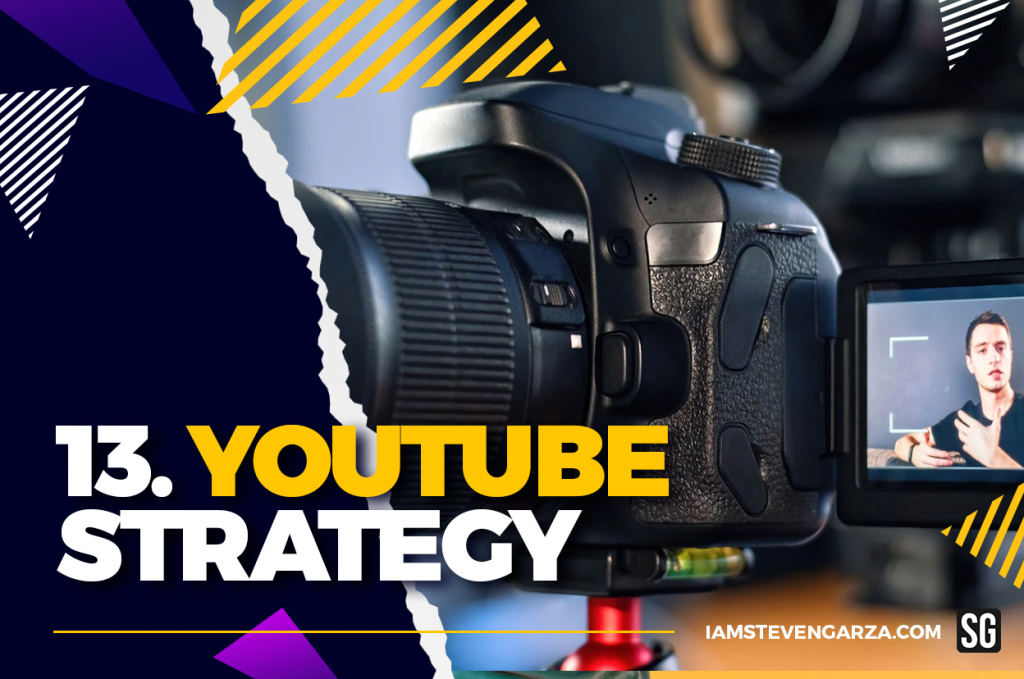
YouTube’s popularity and ubiquity make it a perfect place to establish an online presence. Via YouTube Live, you can take advantage of the current demand for live video, broadcasting in real-time to your audience.
But what to film? There are so many creative event marketing ideas for video: sneak peeks, introductions to headliners and sponsors, insight into what participants will gain, or practical tips for how to make the most of the event.
YouTube is a platform that is recognized as an important music discovery channel for many demographics, so not being there is missing an immense opportunity to be where your audience is sure to be.
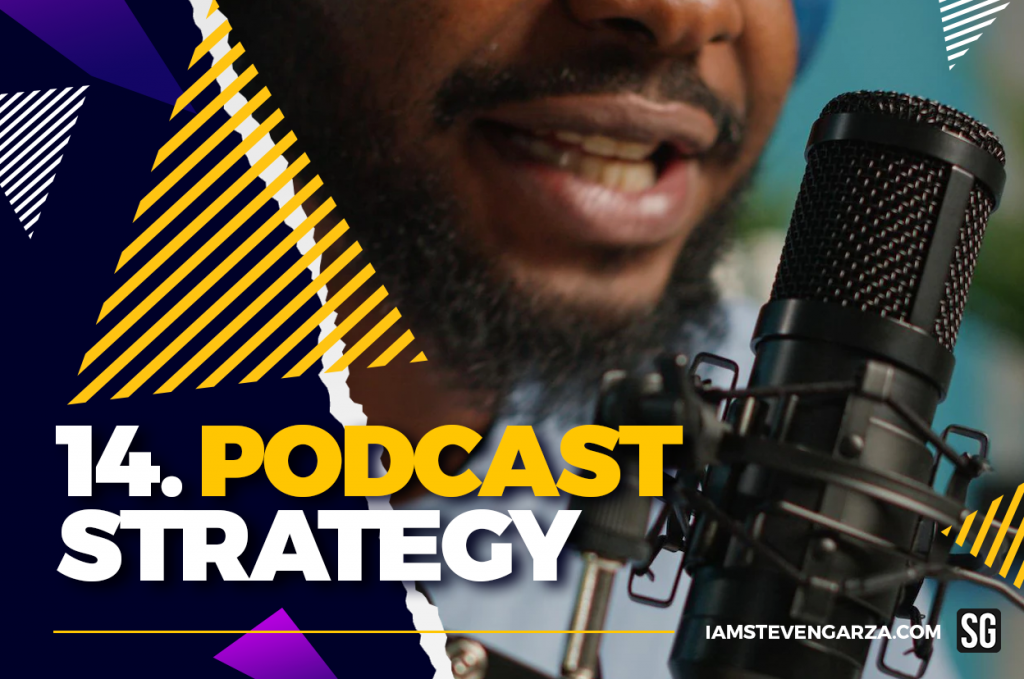
Make podcasting part of your event marketing strategy. All you need is a decent microphone, headphones, a mixer, and some recording gear to enter into an industry that is booming and many audiences love to consume. Podcasts can help you reach a wide audience without breaking the bank.
Launch a podcast, with conversations that are relevant to your event. Spreaker is a great tool that is easy to use, very affordable, and allows automated podcast integration into all of the major channels such as iHeartRadio, Spotify, Apple, Amazon, etc.
If you are apprehensive about the commitment, then becoming a sponsor or guest speaker of an existing podcast that draws similar target audiences is a great way to learn more about podcasting and accomplish some of your goals.
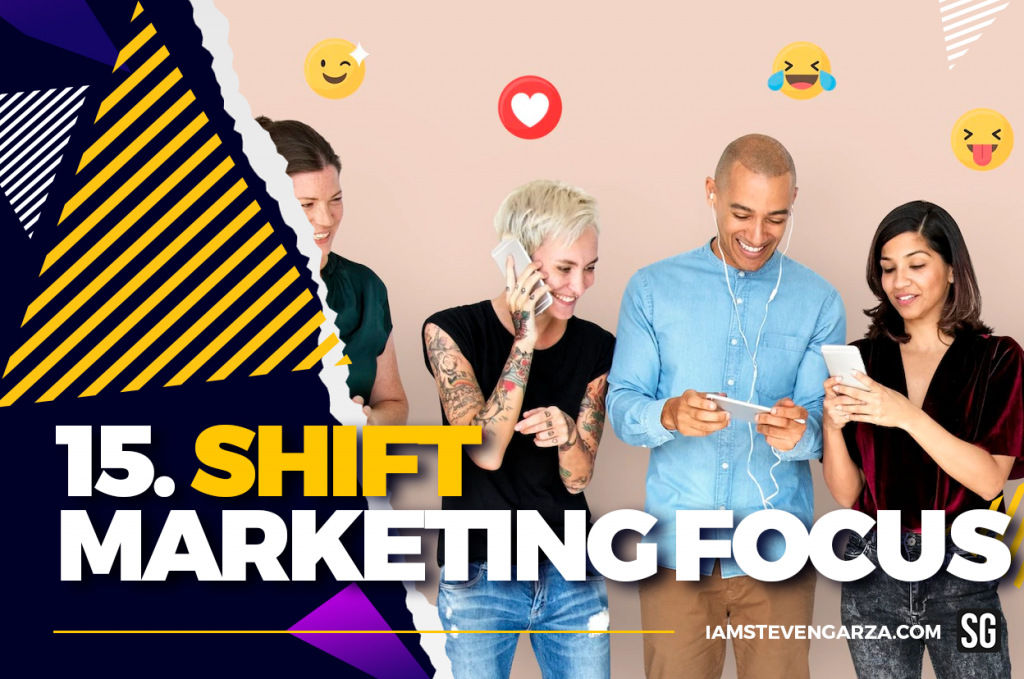
Shift focus from promotional to conversational social media marketing.
It’s important to know when to shift from strict marketing messages to conversational tactics to engage with your social media audience. Doing so will engage potential ticket-buyers in thoughtful conversations. A good balance is the “4:1:1 Rule”: for every promotional post you make, retweet, or share a relevant post, and then post 4 pieces of content written by other people or brands.
You should think of this strategy as giving your followers a way to be acknowledged and form part of the conversation. “Hey, what do you think about this?” Build their trust, acknowledge them and they’ll respect your event brand.
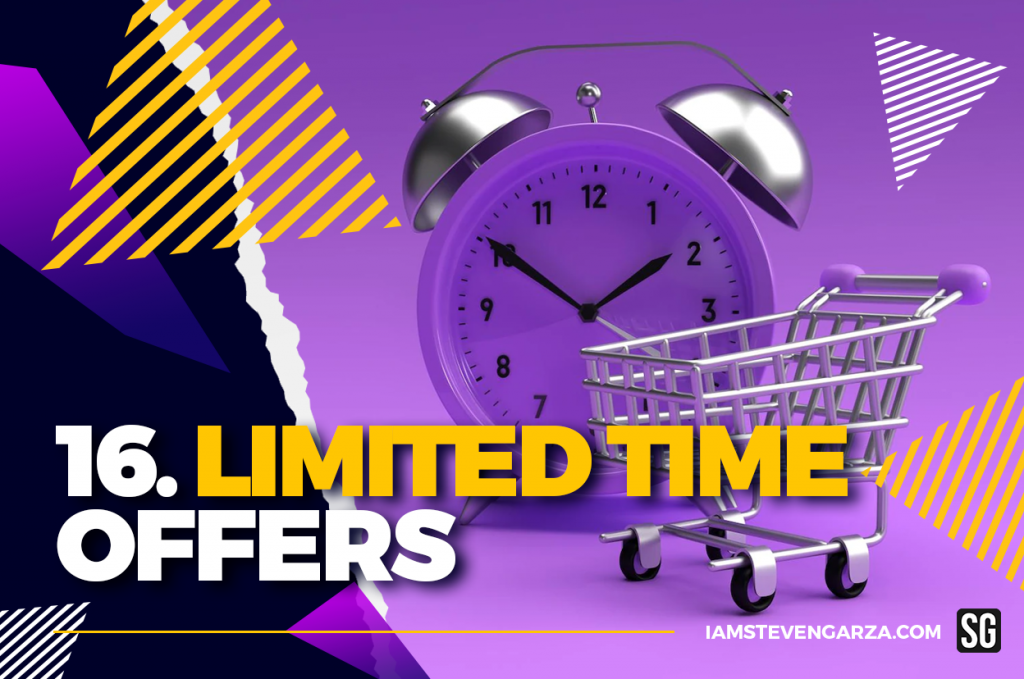
Limited-time offers are a great way to set a sense of urgency and get people to make a purchase. Make it clear that after a certain time and date, the offer will no longer be available. This can trigger FOMO (fear of missing out) which will help drive sales.
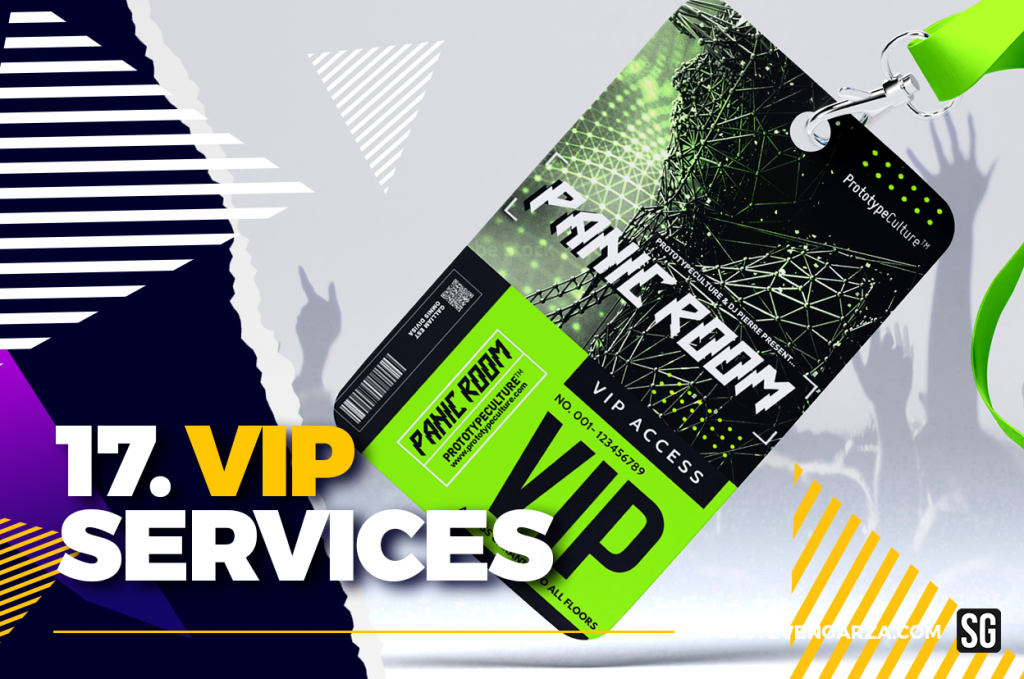
Offer VIP premium services at your event. Having a VIP presence at your events amplifies your online promotion, and provides further revenue opportunities with beverage sales and VIP hospitality and sections.
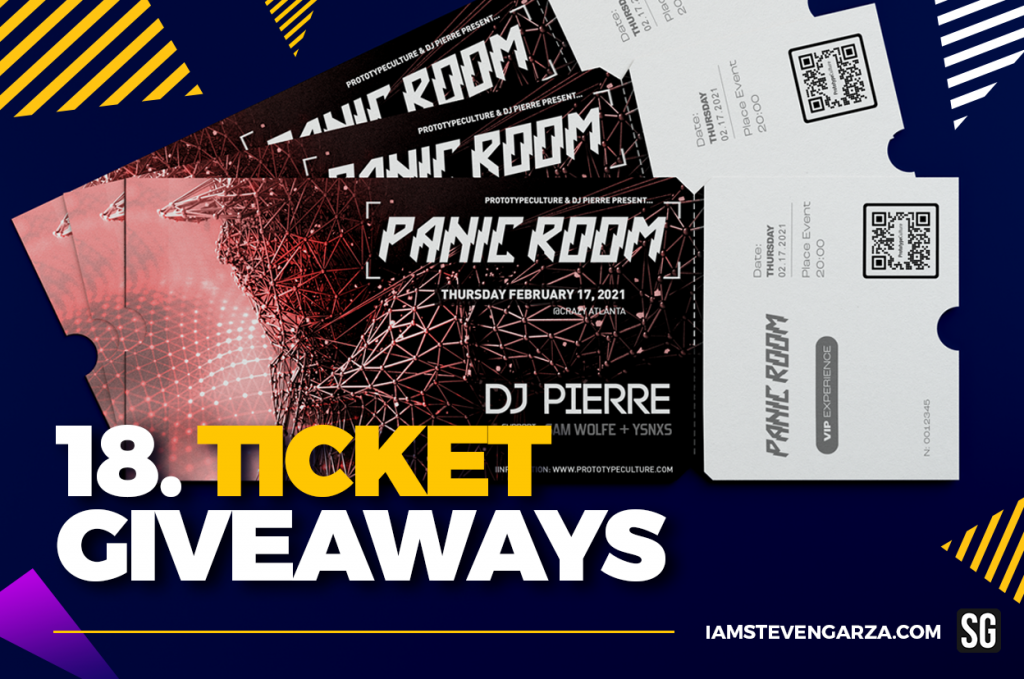
Ticket giveaways can help you develop relationships with organizations and people of interest and also expose your event brand to a different demographic of people who may promote your event and share it with others.
What you may have lost in a few ticket sales, you can gain in loyalty and further promotion, so set a few tickets aside and offer them strategically as comps!
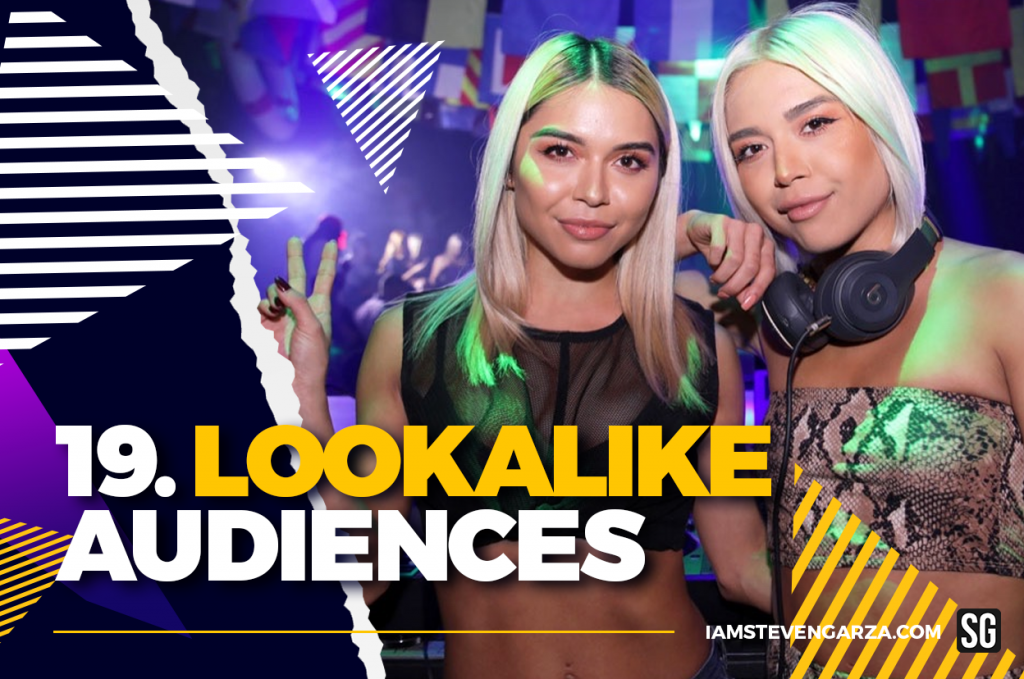
So you have a solid list of people who’ve purchased tickets to your events, now it’s time to grow further by finding more people who share similar attributes.
Facebook, Twitter, Instagram, and Pinterest all have the technology to help you find what is called lookalike audiences. These are people who match your buyer’s persona (profile) in terms of demographics, geography, interests, and online behavior.
Using each channel’s algorithms and automated tools provides great ways to create ads to target those exact people and continue to grow your reach.
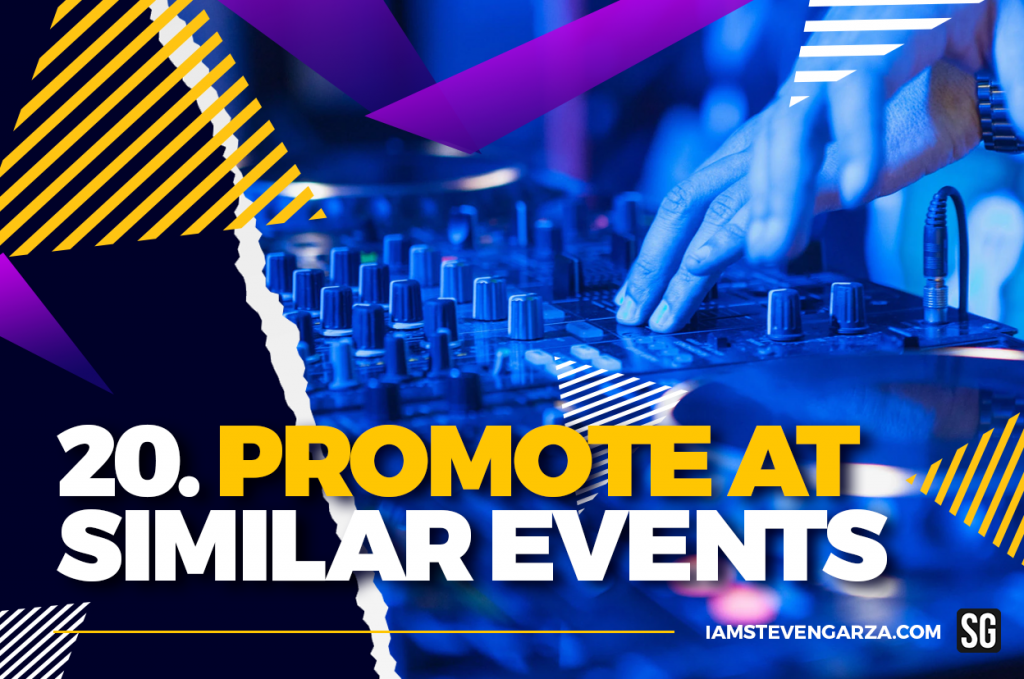
Find events with similar demographics — but that aren’t necessarily direct competitors. This particular concept is an effective way to promote events however needs to be carried out with caution to ensure that it does not pose any conflicts of interest and that you also observe local laws.
This works very well in certain cities, and not as well in others. It depends on how each market’s promotional traditions have been established.
Talking things out with promoters ahead of time can often provide good results if you are professional and courteous, and extend opportunities to also help them achieve their goals.
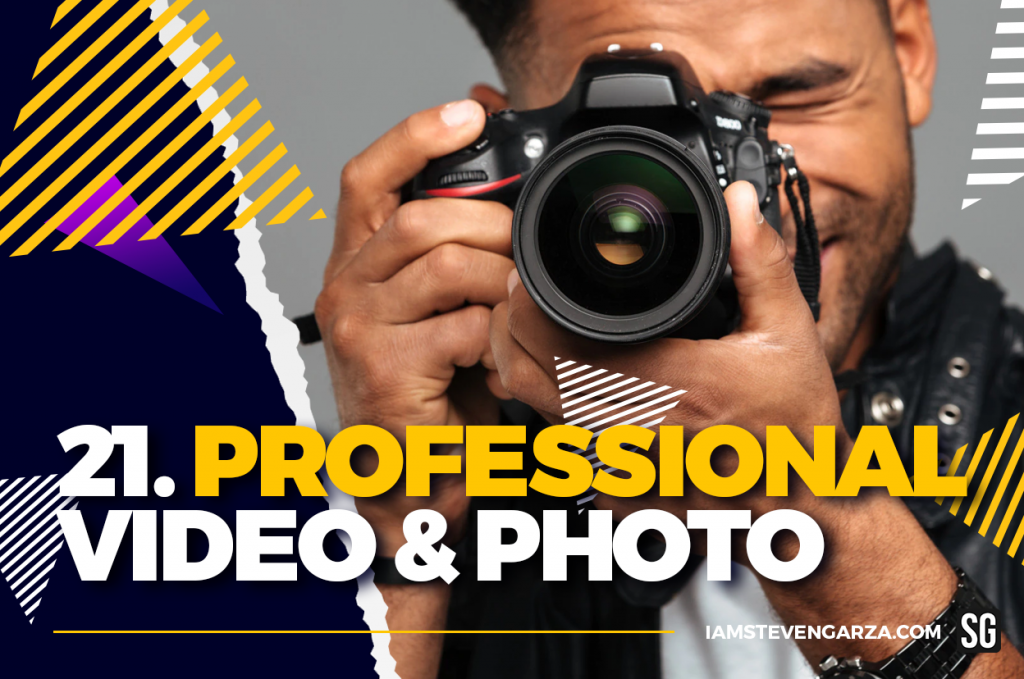
Photographers and videographers are important to have at an event to capture and tell your event’s story. Hire professionals to take well-lit photos that appropriately capture the ambiance and illustrate what people can expect at your event.
People like to be photographed. Posting the content online with proper boilerplate marketing captions will allow further awareness about your shows by allowing attendees to tag themselves, use them as profile pictures or banners that include your logo and information, and provide crowdsourced marketing.
Real-time online content curation and publishing will also allow getting your event to trend on social media.
Photography and video are also crucial for accomplishing other strategies on this list and providing content to produce an event recap.
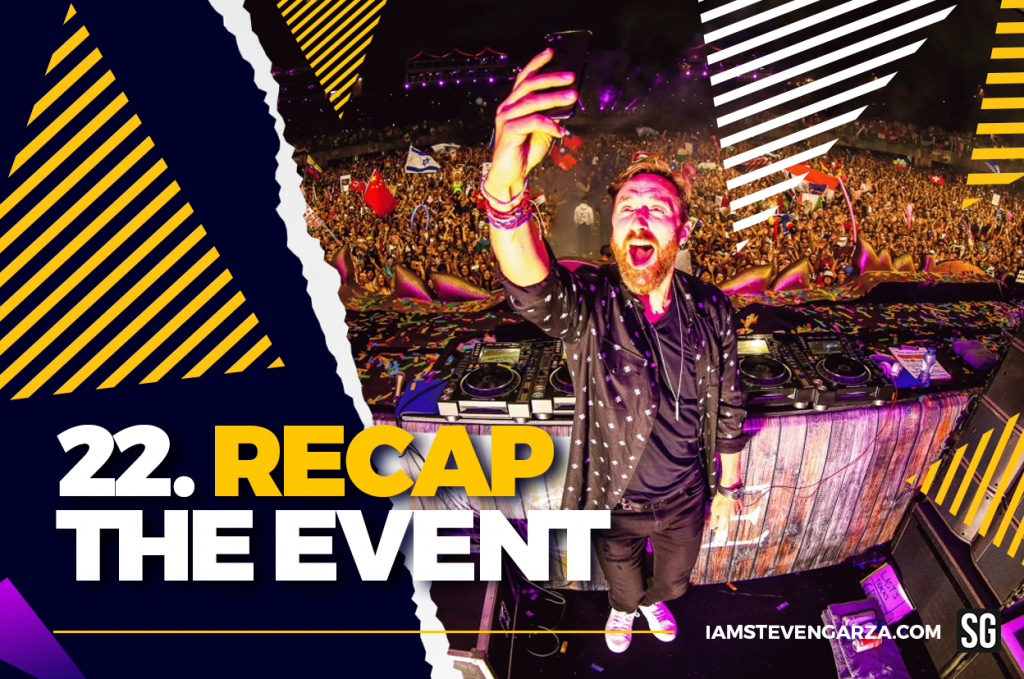
You have spent countless hours, days, weeks, and months promoting and producing your event, and after all of your team’s hard work, you want to make sure that you can capture the event for various reasons.
From a metrics standpoint, recapping your event will allow you to analyze and review all of your accomplishments and challenges to continue to develop, and fine-tune future marketing strategies.
From a content standpoint, it will give your attendees and those who didn’t make it, a view of what the experience was like and make sure they don’t miss out on future events!
From a marketing standpoint, it can provide a comprehensive story of how successful your company is in connecting with audiences and creating quality events to engage future partners and sponsors to grow and scale future projects.
Power 96.1’s Sold-out Jingle Ball Festival Recap Video
Conclusion
Event marketing in a way is an art form. It brings like-minded people to celebrate their passions, bring friends together, and make new ones along the way!
It takes a lot of passion to be successful in this space as you need to be ready to face any potential challenges and continue to move on to the next event. Being aligned with good moral values and ethics is important to have longevity in this industry.
There are thousands of ways to connect with people in event marketing, but finding what works best for you and your industry is what matters.
I hope that you find value in the information in this article to begin to develop your strategy for your next event in 2022.
